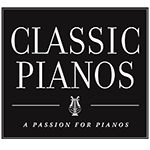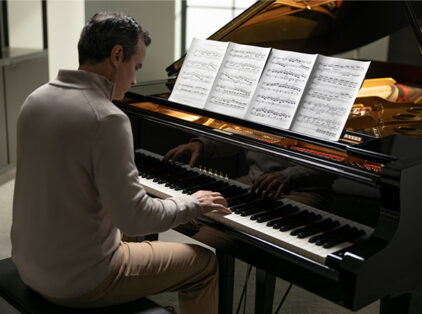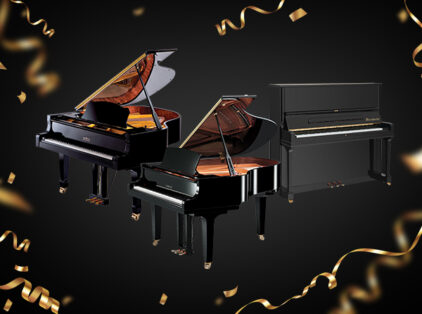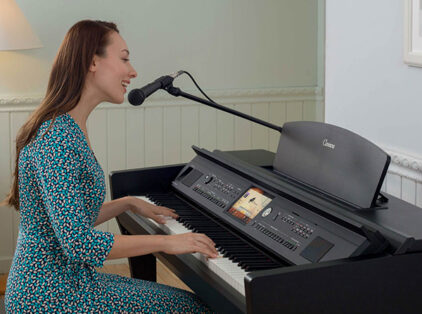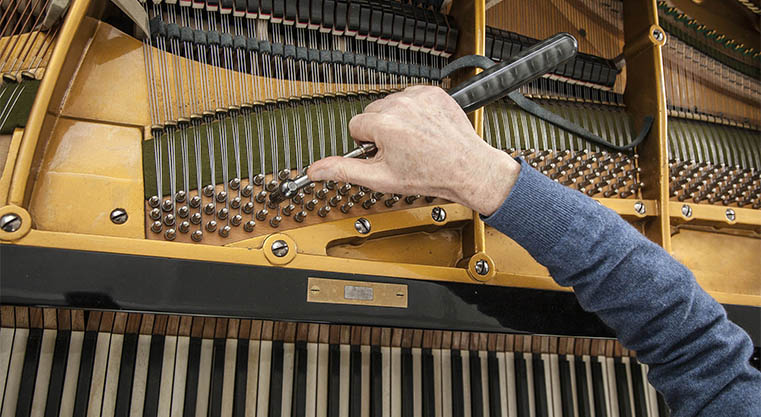
Piano Maintenance & Care Tips
Once you’ve welcomed a beautiful new piano into your home, you’ll want to ensure it stays in excellent condition. Not only will you be protecting your investment, but you’ll help your piano to look and sound great. By taking a few thoughtful steps, you’ll enjoy your piano for years to come! Advice on piano maintenance for the modern home may differ from that of years gone by when few houses had both central heat and air conditioning, but many rules still apply.
Piano placement
First and foremost, place your piano in a room where the temperature and humidity are stable and constant. Never position a piano over a heater or air conditioning vent or too close to a working fireplace. Keep it at least ten feet away. Don’t place a piano too close to an open window or outside door as these allow moisture into the room. All these factors, if unheeded, cause the natural wood in critical areas of your piano to fluctuate. This is especially concerning if the soundboard is affected because it results in a piano constantly out of tune.
Room temperature & humidity control
Constancy is the key. We recommend 68-72 degrees year-round with humidity ranging from 35% to 45%. You can purchase a hygrometer device, which measures the humidity in your room, from almost all hardware stores. Be sure to get one that measures the relative humidity (or humidity relative to the temperature). Don’t skimp and buy the cheapest model. A few extra dollars paid for a quality hygrometer pays big dividends in the long-term health of your piano.
Tuning
One of the most frequently asked questions we receive is, “How often should my piano be tuned?” Because of different factors, there is no definitive answer to this question. After delivery, your piano is adapting to its new environment with the strings and soundboard expanding and contracting due to changes in temperature and humidity. Because of this, we recommend tuning your piano frequently during the first year in your home. It’s also during this first year that your tuner will set the proper pitch by stretching the strings during each tuning. It generally takes a year for the piano to properly settle in. After the first year, we recommend the piano be tuned at least two times annually. If you don’t tune your piano as often as prescribed, it won’t be damaged, but frequent tunings allow the instrument to perform at its maximum level.
Regulation
Regulation is the adjustment of all the mechanical parts of the piano to ensure exact tolerances, making sure the instrument is responsive to the pianist at every level of playing. These fine adjustments allow the player to fully express their musical ability. As with tuning, there is no set standard of when a piano should be regulated. How often the piano is played and room climate are factors in regulation frequency. Some players may request regulation once a year and others very infrequently. A conversation with one of our tuner/technicians at the time of tuning will help you decide when and if your piano needs this service. All pianos from Classic Pianos are fully regulated and prepared before delivery to your home.
Cleaning
Regardless of the finish, whether high-polish or satin, never clean your piano with standard furniture polish or wax. For wood finishes, simply use a clean cloth slightly moistened with water. For high polish finishes, we recommend cleaning with Cory Polish using a microfiber cloth. To clean your keys, we recommend using Cory Key-Brite cleaner. This cleaner brightens and cleans both plastic, ivory, and favorite keys. You can purchase Cory polish and Key-Brite cleaner from our showrooms.
Children & pianos
Few scenes evoke more joy than seeing young children enjoying and playing the piano. Teaching children the basics of good piano care goes right along with learning to play it. Here are a few suggestions:
- Keep food and drink away from the piano. Spills on the piano can harm the finish and spills on the keys or inside the piano can cause serious damage to the moving parts and soundboard.
- Keep hard objects including small plastic toys, away from the piano. They can scratch the surface of the piano or the keys can chip. Never drop anything inside the piano. It can cause the keys to jam or even break.
Contact Classic Pianos with your piano questions!
Are you ready to embark on a new adventure? Experience the many ways bringing a piano into your home can enrich your life. For hundreds of years, the piano has served as the foundation of families and communities thanks to its deep cultural and historical traditions. We encourage you to carry on these customs while creating new traditions in your home.
Our team of experienced piano specialists is ready to guide you through our vast selection of new and used pianos until you find the one that’s right for you, no matter where you are on your musical journey! Contact us online or call 503-239-9969 today.
